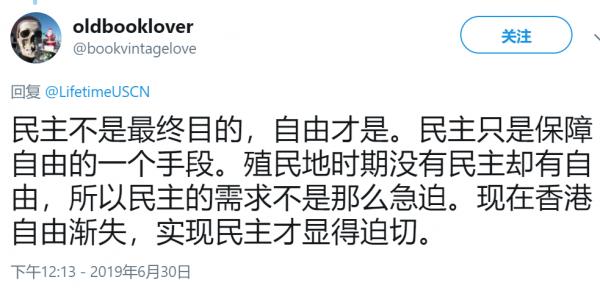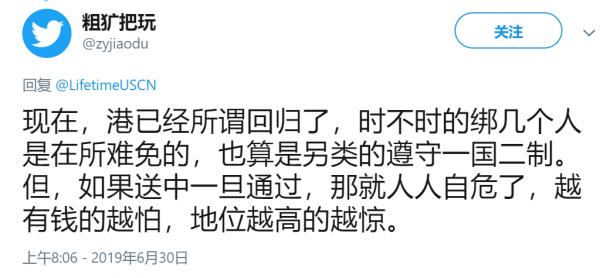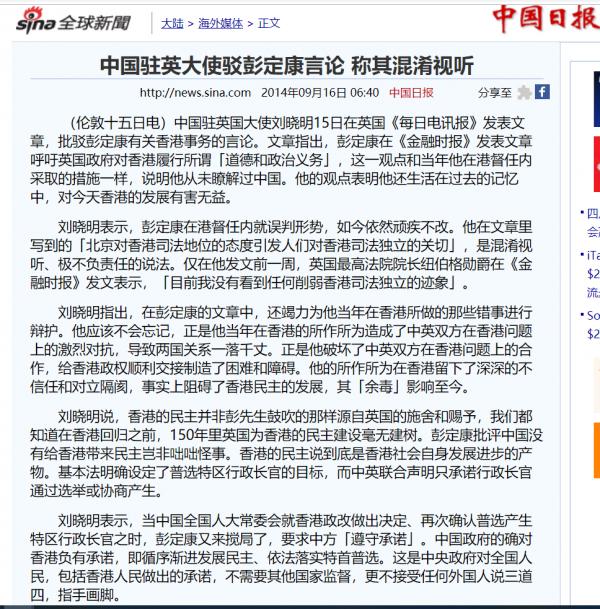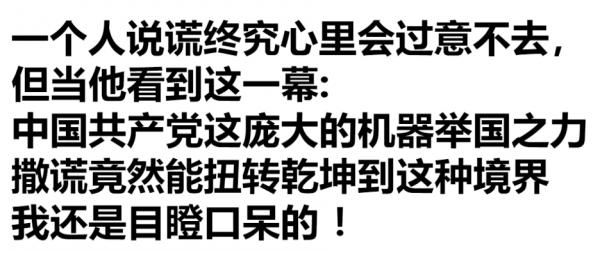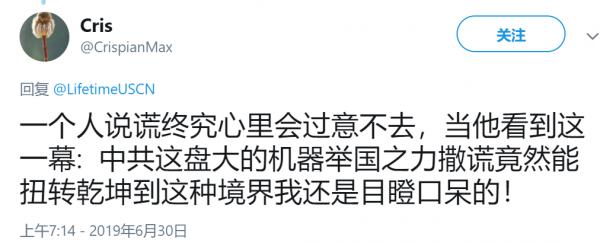| 周恩来不允许英国给香港民主敢给就解放全香港! |
| 送交者: 2019年07月01日12:55:59 于 [世界时事论坛] 发送悄悄话 |
|
|
|
1958年1月30日星期四,中国总理周恩来会见访华的英国 Lieutenant Colonel Cantlie 时,希望 Cantlie 向当时的英国首相 麦美伦(Harold MacMillan)转达以下立场:
大家或会问,假若当时英国坚持给香港民主自治,中方会如何回应呢? 1960年10月29日,当时出任“华侨事务委员会”主任的廖承志, 与香港工会代表访京团聚会时,批评当时美国人建议在新界建立 “自治政府”,并警告英方:
左一 廖承志 1960年访问河内
为何英国不早给香港民主?英国档案提供了答案 2014-06-25 23:28 来源: 辅仁媒体 作者: 毛来由 “我们(英国人)五十年前就可以给予香港民主,但若然这样做, 中国会爆发,甚至入侵香港,这是我们的忧虑。”和黄前董事总经理 马世民(Simon Murray)在一次报章专访中这样说。一直以来,亲 北京的公众人物和报章评论,甚至一般市民,都质疑英国为何百年来 都不给香港民主,要到1984年《联合声明》签署,香港前途确定以后, “才大搞民主”。其实,只要稍读英帝国历史,就知道在二次大战结束 后,英国在绝大部份殖民地,都实行政治改革,逐步建立由当地公民 普选产生的政府,以达至独立(如马来西亚),或自治(如1959年的 新加坡、今日的直布罗陀)。这里所讲的自治(Self-Government), 是指除了国防外交,有时还包括内部保安继续由英国负责外,所有 事务都交由当地民选政府全权处理。 可是,为何香港会成唯一的例外呢?近日《明报》和《苹果日报》均 就着英国最新解密的档案,做专题报导,而笔者在数年前,也因研究所 需,在英国国家档案馆翻阅有关1950至70年代初香港的档案,结果发现 当时的英国高层官员,一致认为若英国让香港人普选自己的议会和政府, 中国必定强烈不满,进而使中国决定提早收回香港。在众多档案中,以 原属高度机密(Secret)的外交部FCO 40/327档案中的报告和书信, 最能够反映当时中国坚拒香港走向民主自治。 在1971年5月3日,准备出任港督的麦理浩,与英国外交部次官K.M. Wilford 对谈时,说他知道早在1956或1957年左右,英方已从访问 中国的非官方人士口中,知道中方反对任何令香港走向独立或自治的 政制改革,但麦理浩仍想知道外交部有没有原文引录中国官员的说话, 以确证中方立场。稍后,外交部内负责研究和远东事务的部门提交了 报告,当中引述在1958年1月30日,中国总理周恩来会见访华的英国 Lieutenant Colonel Cantlie时,希望Cantlie向当时的英国首相 麦美伦(Harold MacMillan)转达以下说话: “任何将香港变成自治领土(作者按:一如新加坡)的行动, 中国均会视之为非常不友善的举动。中国希望现时香港的殖民地 政治状态,丝毫不变。” 周恩来讲话的原文 大家或会问,假若当时英国坚持给香港民主自治,中方会如何回应呢? 1960年10月29日,当时出任“华侨事务委员会”主任的廖承志,与香港 工会代表访京团聚会时,批评当时美国人建议在新界建立“自治政府”, 并警告英方: “英国不会喜欢美国这个建议,是无容置疑的……美帝国主义者将 永远不会成功。可是,若这个建议是由英方提出的,就是另一回事了, 非常时刻,我们将毫不犹疑采取积极行动,解放香港、九龙和新界。” 廖承志讲话的原文 随后,廖指出中方从不承认港九新界是英国领土,但因为英国继续 管治香港,对中国有利,所以才不要求收回;中国希望收回的,是 发展良好的香港,而不是一个如废墟般的地方。 上述文件,相信可以解释为何其他英国殖民地,都逐步建立起民选本土 政府,但香港仍依旧维持总督和殖民高官独裁(雅称为“行政 主导”),立法局只有委任议员,只是在市政局设有民选议席,而有 选举权的人数,从不超过当时总人口的12%。这情况到了1980年代中期, 才有改变。 可是众所周知,中方不太欢迎这种改变,在1984年,当港府建议引入 立法会民选议席时,时任新华社香港分社(即今中联办)主任许家屯, 公开狠批英方“不按本子办事”,所谓“本子”,就是《中英联合 声明》。(详情可参阅许家屯流亡美国后写的《许家屯香港回忆录》 上册,此书在1993年出版,现已绝版,但可在各大图书馆借阅) 为免字数太长赶客,笔者在此草草收笔。本人希望拙文,以及近日 有关英国解密档案的报导,可以引起香港人对香港历史的兴趣和关注, 支持香港研究,并要求政府订立《档案法》,妥善保护重要史料,否则, 以后我们都没有详细可信的香港史可读了。 FCO 40/327的封面
By Gwynn GuilfordOctober 10, 2014 By Sep. 29, peaceful protesters had been clogging Hong Kong’s downtown for less than a day, but to the Chinese Communist Party this already smacked of ingratitude. Here’s an excerpt from an editorial that ran that day (link in Chinese) in the People’s Daily, the party’s official mouthpiece, entitled “No one cares more about Hong Kong’s future destiny than the entire Chinese people”:
Of course, this argument doesn’t change the fact that the Chinese government’s version of “universal suffrage“ requires that Hong Kong voters pick from candidates Beijing has essentially selected for them, reneging on past promises. That aside, the Communist Party’s new pet argument seems to make some sense—or at least, it would have until recently. In the last couple years, however, the British government has declassified a cache of colonial records that tell a very different story. Take for instance this document, which describes what British lieutenant-colonel Kenneth Cantlie relayed to British prime minister Harold MacMillan about his conversation with premier Zhou Enlai in early 1958: BRITISH NATIONAL ARCHIVES In it, Zhou says Beijing would regard allowing Hong Kong’s people to govern themselves as a “very unfriendly act,” says Cantlie. Not long thereafter, in 1960, Liao Chengzhi, China’s director of “overseas Chinese affairs,” told Hong Kong union representatives that China’s leaders would “not hesitate to take positive action to have Hong Kong, Kowloon and the New Territories liberated” if the Brits allowed self-governance: BRITISH NATIONAL ARCHIVES These documents—which, perhaps unbeknownst to the People’s Daily, Hong Kong journalists have been busily mining (link in Chinese)—show that not only were the Brits mulling granting Hong Kong self-governance in the 1950s; it was the Chinese government under Mao Zedong who quashed these plans, threatening invasion. And the very reason Mao didn’t seize Hong Kong in the first place was so that the People’s Republic could enjoy the economic fruits of Britain’s colonial governance. This revelation suggests that the Chinese government’s current claims of democratic largesse are somewhat disingenuous, says Ho-Fung Hung, sociology professor at Johns Hopkins University. “The whole argument that Beijing’s offer is better than the British’s—it no longer holds,” he tells Quartz. “Beijing can no longer say there were bad things during colonial times because it’s now been revealed that it was part of the force that maintained the status quo in Hong Kong. Beijing is partially responsible for the lack of democracy in Hong Kong before 1997.” It’s long been known that in the 1980s, once the Brits knew they were going to be leaving and tried to speed up democratic reform, the Chinese government threatened them not to, notes Hung (a point to which the People’s Daily editorial obliquely refers). AP PHOTO/NEAL ULEVICH British prime minister Margaret Thatcher and Chinese premier Zhao Ziyang exchange signed copies of the Hong Kong handover agreement in Beijing on Dec. 19, 1984. In the early 1980s, when prime minister Margaret Thatcher began negotiating with China’s leaders—president Deng Xiaoping and premier Zhao Ziyang—what grew into the Sino-British Joint-Declaration of 1984, Britain had leverage. Treaties signed in the 1800s stipulated that the Brits were only to hand back the northern swath of Hong Kong called the New Territories—and not Hong Kong island or Kowloon (i.e. the major financial and commercial areas), which China also wanted. Beijing also needed the handover to go smoothly in order to convince Taiwan, an independent island state that it nominally laid claim to, that the “one country, two systems” approach could work. In addition, Hong Kong was still a major financial center and trade hub for China too. But China had leverage too. In fact, in 1982, when negotiations began, the Hang Seng Index was already shaky due to fears that if China took over, the Communist Party would gut Hong Kong’s rule of law or nationalize wealth, causing the market to crash and capital to flee: WIKIMEDIA COMMONS The Brits needed to calm markets and ensure financial stability. That meant making sure the handover agreement protected British financial interests. But as documents from Thatcher’s archivedeclassified in 2013 reveal, it also meant publicly cooperating with China. In the following memo (pdf, p.3), Thatcher tells Deng that the issue wasn’t what happened in 1997, but what everyone in 1982, when they were talking, expected to happen: MARGARET THATCHER FOUNDATION Thatcher’s handwritten margin notes appear to refer to the Cultural Revolution and the Gang of Four trial, both of which were socially disruptive. And here’s an example of Beijing’s threats to British diplomats on preserving Hong Kong’s status quo, from the same memo recording Deng and Thatcher’s discussion (p.10): MARGARET THATCHER FOUNDATION What the documents from even earlier show is that this showdown—Brits floating democracy, Chinese leaders threatening to invade—had been going on since the 1950s, three decades before we previously knew. Why did neither ever happen? Hung says that the Brits wanted to make sure they’d protected their economic interests before they departed, much the way they did in Singapore and Malaysia. And when Mao founded the People’s Republic of China in 1949, he and Zhou Enlai decided not to seize Hong Kong—which the British at the time expected—because the capitalist territory was their lone source of foreign exchange and a strategic portal for manufacturing trade that would eventually drive China’s double-digit growth. As the newly declassified documents reveal, China’s leaders explicity wanted to “preserve the colonial status of Hong Kong” so that the People’s Republic could “trade and contact people of other countries and obtain materials” it badly needed. Both the British and the Chinese governments benefited from the nearly 50-year deadlock of Hongkongers seeing neither democracy nor an invasion. But as the recent protests eerily hint, this limbo can’t endure forever.
北京一直自诩它在香港所做的民主建设,包括给予香港高度自治和 甚至所谓的普选,英国在香港这么多年都没有做到,驻英大使刘晓明 更在人民日报撰文指出“香港回归之前,150年里英国为香港的民主 建设毫无建树”。但原来英国最近解禁的外交文件显示,早在毛泽东 时代,中国的官员已经警告英国不得给予香港民主自治,否则不惜 提早解放香港。
|
|
|
 |
 |
| 实用资讯 | |
|
|
| 一周点击热帖 | 更多>> |
| 一周回复热帖 |
| 历史上的今天:回复热帖 |
| 2018: | 习近平要把国家往哪个方向带?中国民众 | |
| 2018: | 真是遗憾,C罗和梅西双双离开世界杯,两 | |
| 2017: | 中国海外民运分子的基本定位 | |
| 2017: | 对国内印象 | |
| 2016: | 宜家不雅照再出第二波 | |
| 2016: | 建议恢复毛泽东时代的光荣传统,从战斗 | |
| 2015: | 圣经的作者是谁? | |
| 2015: | 浅谈“人民”与“群众” zt | |
| 2014: | 外国学者预言共产党会执政非常久 | |
| 2014: | 徐才厚的倒掉意味着,习近平要打仗 z | |


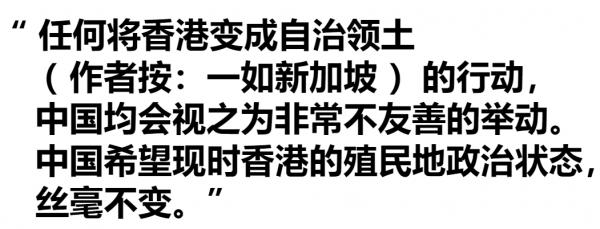


.jpg)
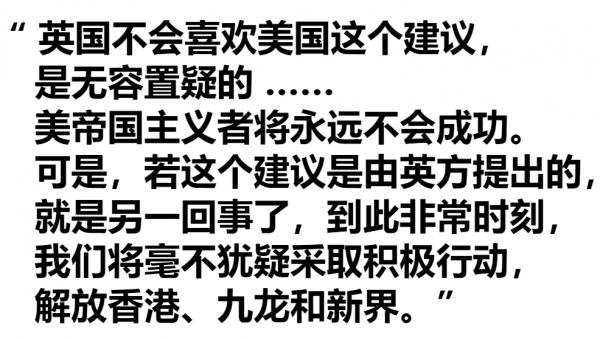

.jpg)
.jpg)

